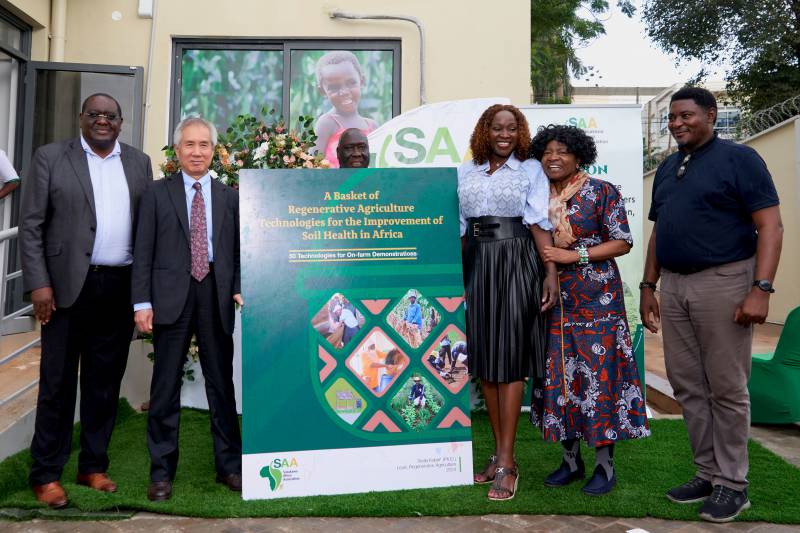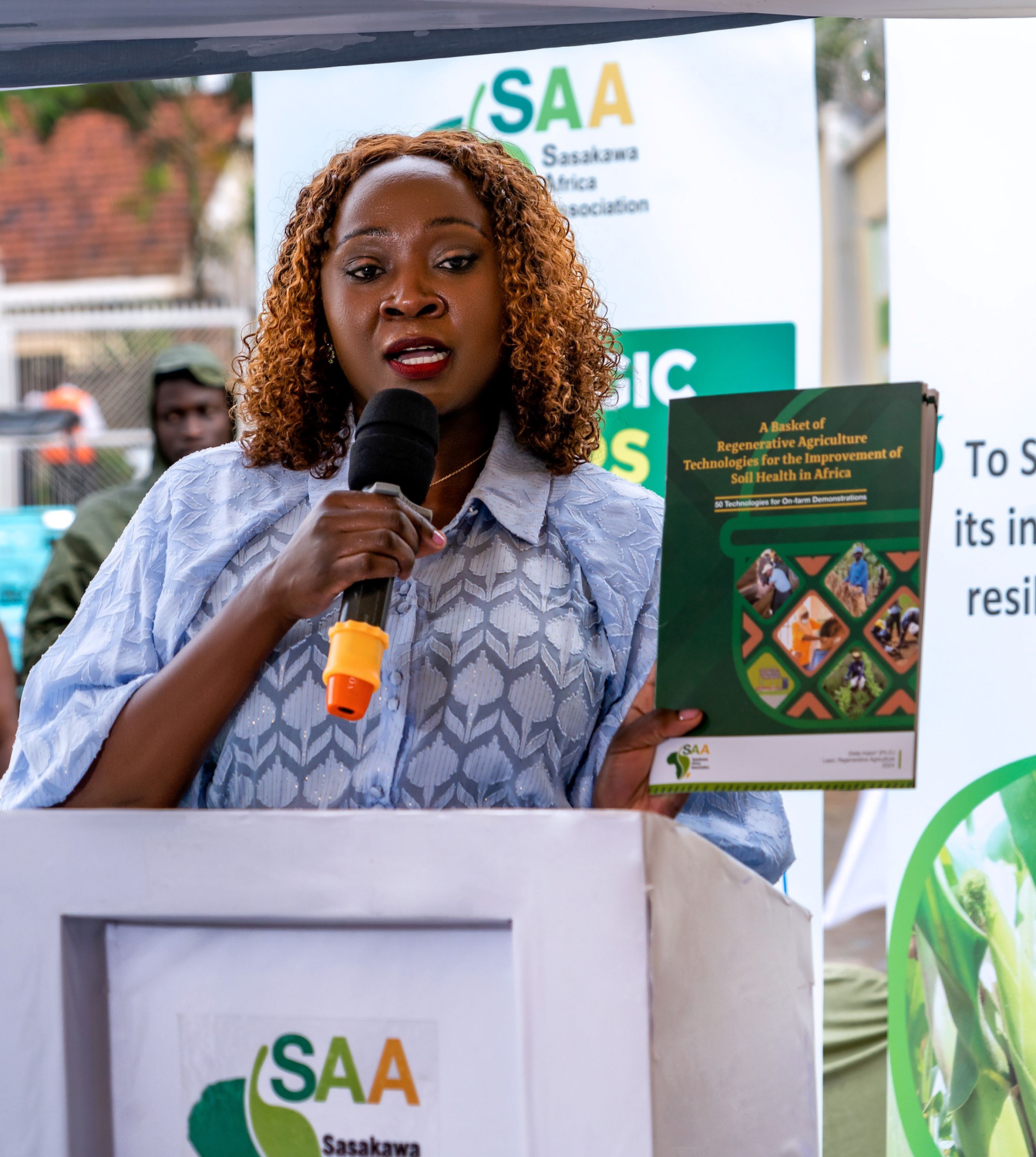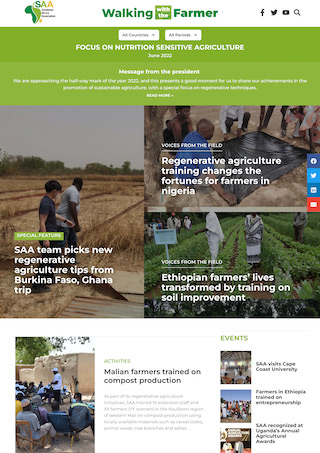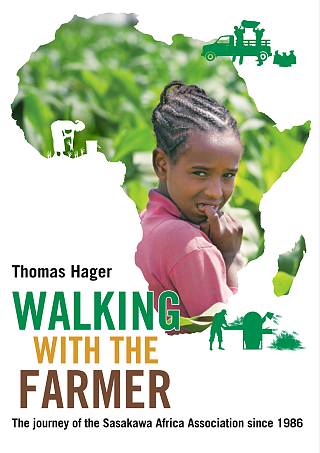Africa’s Soil Rebirth: SAA Launches Regenerative Agriculture Blueprint in Uganda

On January 10, 2025, Sasakawa Africa Association (SAA) unveiled its latest initiative to combat soil degradation in Africa with the launch of the book "A Basket of Regenerative Agriculture Technologies for the Improvement of Soil Health in Africa". Authored by Dr. Stella Kabiri, SAA’s Lead Regenerative Agriculture, the book offers 50 practical and accessible technologies to regenerate soil health across the continent. The event, held at SAA’s Office in Kampala, Uganda, attracted over 80 participants, including thought leaders, partners, and farmers from SAA intervention districts nationwide.
Opening Remarks: A Call for Action
In his welcome remarks, Mr. Robert Tabot Anyang, SAA Country Director for Uganda, paid a heartfelt tribute to President Jimmy Carter, co-founder of SAA. Reflecting on Africa’s agricultural journey, he remarked, “Africa can feed itself if we pay attention to regenerative agriculture. Things have changed—our soils are no longer the same. These days, you cannot find a single earthworm anymore, which is a sign that our soils are depleted."
Dr. Makoto Kitanaka, SAA President, highlighted the nexus of sustainability and digitalization. "Africa's agriculture faces tough conditions due to climate change. However, sustainable practices, supported by digital innovations, offer a path forward," he noted. Dr. Kitanaka also underscored SAA’s over three-decade legacy in supporting smallholder farmers in Africa and its active promotion of regenerative agriculture since 2021. He also stressed the importance of Artificial Intelligence (AI) in revolutionizing agriculture and bolstering youth employment.
Youth as Catalysts for Change
Prof. Ruth Oniang’o, Honorary Advisor and former SAA Board Chair, emphasized the transformative role of youth in African agriculture. “The youth are not just our future—they are our present,” she stated, urging for their engagement in agriculture as a viable business and a pathway to prosperity. She reminded the audience of SAA’s enduring commitment to empowering farmers, building resilient food systems, and advancing agricultural technologies.
H.E. Prof. Sarah Anyang Agbor, representing the African Union, delivered a powerful address linking youth engagement in agriculture to the African Union’s Agenda 2063. She outlined critical areas for focus, including access to finance, capacity building, policy reform, and technological innovation. “Africa's youthful population holds the key to unlocking agricultural potential” she stated.
Empowering Farmers with Knowledge and Tools
Ambassador Philip Idro, Principal Advisor at Operation Wealth Creation, echoed concerns about Uganda’s rapidly depleting soils. He stressed the importance of training extension workers to ensure the success of regenerative agriculture initiatives. “Farmers need knowledge, tools, and support to rebuild Africa’s soils and secure its future,” he urged.
Dr. Edward Katende emphasized the critical role of Commercial Community-Based Facilitators (CCBFs) in bridging gaps in the extension system through the Parish Development Model. These facilitators connect farmers to inputs, extension services, business development, markets, and training on tools like the Wendy mobile wallet, ensuring a direct link between farmers and essential services to enhance productivity and sustainability.
Collaborative Efforts and Innovations
Dr. Mel Olouchi, SAA’s Strategic Partnership Director, highlighted the importance of partnerships and validation processes for regenerative agriculture technologies. “This is about lifting farmers out of poverty while restoring degraded soils” He explained, citing collaborations with the African Union, research institutions, and farmers.
Dr. Stella Kabiri presented her book as a farmer-centric guide to reversing Africa’s soil degradation crisis. “From mulching to crop diversification, the eleven principles in this book aim to enhance soil fertility, reduce erosion, and mitigate climate change impacts,” she explained. Highlighting SAA Uganda’s success, Dr. Kabiri reported that regenerative agriculture has boosted crop yields for coffee and bananas by over 50%, while reducing farmers’ reliance on chemical fertilizers. “Our soils are resilient, but only if we care for them. This book provides tools to ensure Africa’s farms remain productive for generations,” she added.
 Dr. Stella Kabiri presenting her book
Dr. Stella Kabiri presenting her bookVoices from the Field
Farmers and CCBFs shared their experience during the event. Ms. Justin Nayiga Katushabe, a farmer, trainer, and entrepreneur from Mubende district, highlighted the potential of simple mechanization to improve soil fertility and reduce production costs. for farmers. She explained that CCBFs play a vital role in training farmers on the effective use of these technologies. “Many farmers didn’t realize the value of these innovations, but now they are seeing how simple mechanization can transform their farming practices and reduce costs,” she noted.
Mr. Abdu Seryazi, a CCBF and leader of the Zirobwe Kalagala Youth Multipurpose Cooperative Society, shared his experience in supporting over 1,000 farmers with mechanization, spray services, and digital tools like garden mapping. "Mechanization is transforming agriculture, and with youth at the center, we can achieve the National Development Plan, Agenda 2063, and Sustainable Development Goals," he noted.

CCBFs holding RA tools handed over by the SAA team
Practical Demonstrations and Symbolic Gestures
Another key highlight of the event was a hands-on demonstration, showcased innovative tools such as solar-powered irrigation system, motorized tiller and jab planters, offering participants a practical understanding of these sustainable technologies.
In a symbolic gesture, SAA leadership handed over important regenerative agriculture tools, including jab planters, motorized sprayers, manual sprayers, and motorized weeders, to the CCBFs to support their work.

Demonstration on the proper use of jab planters
In conclusion, the event marked a transformative milestone in addressing soil degradation and empowering farmers with sustainable solutions. It reaffirmed SAA's commitment to revitalizing Africa's agriculture for future generations.
To access this invaluable resource, kindly click the link below for a downloadable version.
SAA Publications

E-newsletter
"Walking with the Farmer"
SAA publishes a bimonthly e-newsletter reporting on SAA activities.

SAA history book
"Walking with the Farmer: The journey of the Sasakawa Africa Assoication since 1986"
This book chronicles the history of SAA from its inception to the present.

Annual Report
Annual Report FY2023
Annual Report FY2023 is available here.





